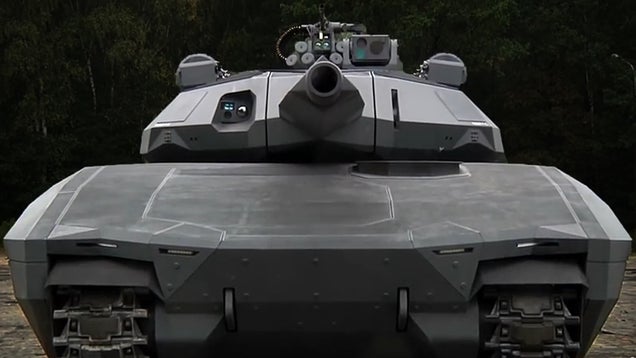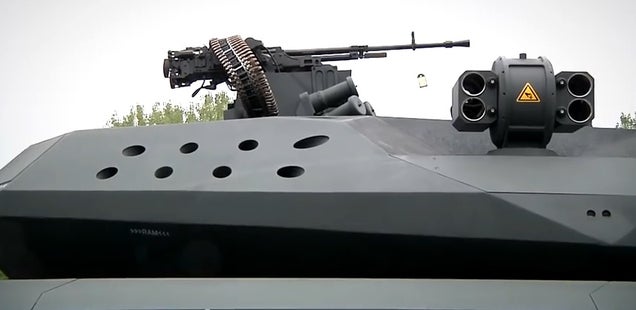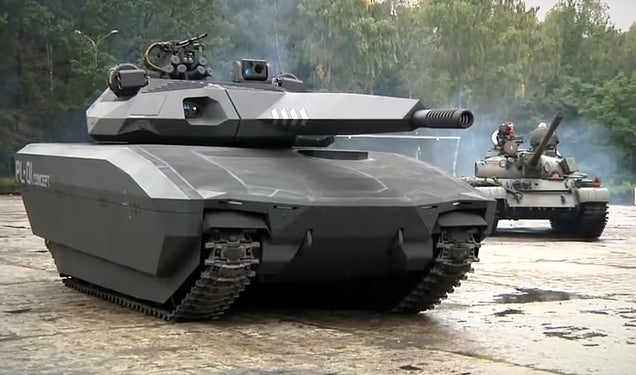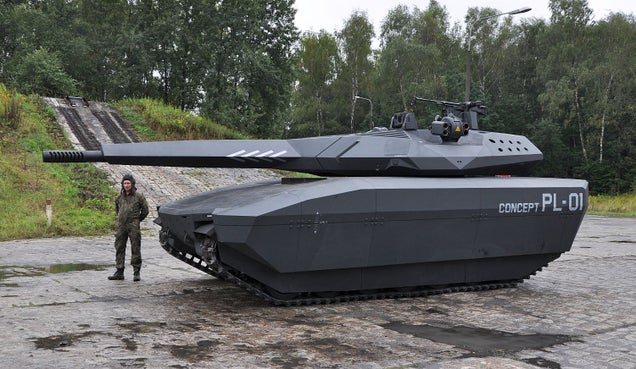
Has Poland's OBRUM and its partners designed the tank of the future? The PL-01 does pack some incredibly valuable features into a fairly compact and modular concept, and yes, it also looks cool as hell!
The idea of the PL-01 is to try and eliminate the infrared, radar and visual signature of the traditional tank to a large degree, while also relying on guile to take identity masking a step further. In addition, the PL-01 concept aims at brining to market a tank packed with relevant modern features, many of which already exist off the shelf, while others are still on the developmental horizon.
The vast majority of targeting sensors on the battlefield today rely on the infrared band of the electromagnetic spectrum to do their bidding. The PL-01 attempts its almost magical infrared signature reduction via the installation of temperature controlled wafers that blanket its exterior. This chameleon's skin of sorts, allows the tank's skin to match the infra-red signature of its surroundings. It does this by processing what small infrared sensors mounted around the tank detect, and then displays a pattern on the tank's honeycomb-like covering that best matches the infrared data collected.
As a result, the tank all but disappears to infrared sensors. Even more outstanding, these wafers can also be used like pixels, as each can be manipulated in temperature. This allows for the tank to use active infrared camouflage, such as tiger stiping its infrared signature in the jungle, or making it flat like the sand in the desert. The PL-01 also lowers its infrared signature through cooling and dispersing the exhaust from its 940 hp diesel engine.
The PL-01's proposed active infrared camouflage system can even go a step further, from concealment to trickery. The tank can even make itself look like a car or another common object, via matching the temperature of its surroundings and then displaying a preprogrammed image on its temperature controlled wafers. This is an amazing countermeasure that, if reliable, can make enemy detection and the creation of a firing solution almost impossible during nighttime operations for a large percentage of any enemy's anti-tank weapon systems.
Active camoflauge for military vehicles is nothing new, in fact it has been tested as far back as the 1940's via
mounting lights on aircraft, and later ones that change intensity and shade depending on their background. There are rumors that "visual stealth" was tested on aircraft as late as the 1990's.
Even
Boeing's Bird Of Prey programwas said to have tested some forms of visual signature reduction. We have also seen YouTube videos of LED suits that use light sensitive receivers to "cloak" an object, or even more incredible
this new capabilitythat is straight out of the Predator movie franchise. This is precisely what the PL-01's designers say they are working on for their tank now, and future models are claimed to offer both infra-red and visual "cloaking" and "spoofing" capabilities. Such a technology would work in the same way as the tank's infrared masking capability, basically by using data from video or light sensitive receivers mounted around the tank and displaying the image taken from one side of tank on the opposite side. This is similar to putting a camera behind a flat panel TV and viewing the camera's feed on the TV. If the magnification was right the TV would all but disappear from a distance.
With the miniaturization of technology, I would not doubt if a similar system has been tested on aircraft and even ground vehicles in the US as well. Infrared, and even visual detection, remains a low observable aircraft's "achilles heel," and so called "silver bullet" platforms, meant to kick down the enemy's air defenses, or to spy on an enemy without being detected, could greatly benefit from this technology. Although putting such an elaborate system on a 40 ton tank is very different than installing it on a 15 ton fighter, where weight is always an issue.
The infrared spectrum continues to dominate the ground side of the modern battlefield, especially after dark, so having the ability to blend into your thermal surroundings, or to even look like something totally different than what you actually are, should drastically increase your survivability.
The PL-01 tank is also said to be almost entirely coated with radar absorbing material, and the vehicle's very low-profile and faceted design is said to reduce radar returns in a sizeable manner. This could be quite valuable, as detection of armored formations via standoff strategic platforms using ground moving target indicator (GMTI) radar will increasingly be proliferated throughout the world.
Additionally, radars and missiles that use millimeter wave radar for detection and guidance, such as what is found on the Mi-28N and the AH-64D attack helicopters, are also becoming more common place as a means of attacking armored targets under adverse weather conditions.
Finally, modern fighter and attack aircraft can use their radar systems to detect, and even target armored vehicles, even while those vehicles are moving. With this in mind, lowering the radar signature of a main battle tank, thus decreasing its detection range, can mean the difference between life and death when a roaming pack of enemy multi-role fighters is out hunting for tanks to plink.

The PL-01 is also quite intuitive and efficient with its general design, as it only uses three crew, and has an auto-loading system in its turret that carriers 16 rounds (24 more are stored in the hull). The turret, which is unmanned, is modular in nature, and may allow for different turrets, with different capabilities, to be to be interchanged if need be. The PL-01 was designed to field a 105mm or 120mm smoothbore cannon, that will be capable of firing sabot, high explosive, or guided missile rounds. In addition to the main gun, the PL-01 will have a 7.62mm coaxial gun internally mounted turret right next to the main gun, in a similar configuration to the Abrams, as well as a detachable remotely controlled 7.62 or 50 caliber independent gun turret system.
For the tank's commander, gunner and driver, the latest multi-spectral sensor and targeting systems from BAe and its affiliates are also proposed to be integrated into the stealthy tank. This may include a
distributed aperture system(DAS) like spherical situational awareness visual system, similar to what is found on the F-35. Similar systems, albeit of a less complex design than
the one found on the F-35Joint Strike Fighter, are now being adapted for nautical and land-based applications. In the case of a tank, this could mean that the Tank Commander could potentially wear a helmet mounted sight that would allow him to "see clearly through" the walls of the tank, day or night.
This is done by taking a constellation of staring camera sensors placed on the outside of the vehicle, and then stitching their video images together using software and sheer processing power. This virtual visual sphere can then be projected into the tank commander's helmet mounted site. Think of a virtual tour of a room in a home, but real-time imagery. In effect, such a system would provide a tank commander a full 360' day or night view of the outside of his tank. Additionally, this system could also automatically detect targets, both in the air and on the ground, or even movement around the tank if it is set to do so.
The PL-01 will also sport active defenses in the form of a
Trophylike system, where electronic actively scanned array (AESA) radars will be installed around the turret. Once a high-speed projectile is detected moving at a threatening vector, the system will fire one of its countermeasure rockets to intercept and detonate infront of the incoming projectile, thus killing it, or greatly decreasing its kinetic energy, before impacting the tank. Also, laser detection sensors will be distributed around the tank so that early warning of an imminent enemy attack could initiate automatic ejection of infrared and laser masking smoke mortars, which are mounted flush with turret to keep the tank's radar signature low.
The PL-01 basic tank will come stock with level 5 ceramic-composite armor installed on its frontal hemisphere, with level four armor on its flanks. Additional plug and play armor is said to also be an option for working in extremely high-threat environments, such as urban battlefields. Currently the PL-01 weighs in at about 33 tons, with the additional armour it is projected to weigh close to 39 tons. This would put it in at about 3/5's the weight of an Abrams and about ten tons lighter than the fully loaded
Russian T-90 main battle tank.

What is also very exiting is that the PL-01, which is based on the
Combat Vehicle 90chassis, will be offered in multiple formats, including a command vehicle, an armored repair vehicle and a mine clearance vehicle. This will allow a forward deployed armored column to work as a single team, using common parts, to accomplish various tasks.
What is also smart, is that designers did not include an ambulance, an armored personnel carrier and other disparate capabilities that would have compromised the effectiveness of its baseline design and most certainly would have added to the PL-01's final cost and overall complexity.
The PL-01 seems like a fantastic concept as it takes a modular approach to proven and effective tank design, while also incorporating new technologies and signature control capabilities that are very intriguing to say the least. Although, as with so many "concept" vehicles and weapon systems, it will be interesting to see if BAe and OBRUM can delivery on their many promises and successfully integrate all these attributes into a reliable and effective weapon system. With that said, the choices as to what technologies to integrate into the PL-01, and how to properly integrate them, seems to be incredibly well thought out and truly intriguing. A full working prototype will be fielded in 2016, with initial production beginning
near the end of the decade according to OBRUM, so we will just have to wait and see if Poland and their British friends have truly revolutionized the tank as we know it.
 Sumber
Sumber